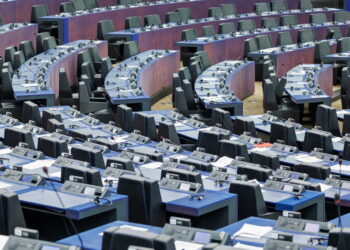Rome – We meet the Italian Undersecretary for European Affairs, Sandro Gozi, on the sidelines of the Erasmus States-General organised in Rome to celebrate the 30th anniversary of the program. In light of the upcoming budget plan, needed to avoid a pending excessive deficit procedure, and the call by a fellow minister for clarity on the intentions of the Democratic Party (of which Gozi is a member) – “I hear ‘no cuts, no taxes, no excessive deficit procedure’, and I wonder how they plan to do that”, the Minister for Economic Development Carlo Calenda intimated this morning – a question on the subject is a must, before moving on to the meeting’s theme, and touching about Brexit.
Eunews – At the national leadership of the Democratic Party, the former Prime Minister Matteo Renzi said that he doesn’t want to hear about an increase in the tax burden in the corrective measures required by the European Commission. Will you be able to find the necessary 3.4 billion without raising taxes?
Gozi – There will be no tax increase, because that would not be fair. The Renzi government had finally begun to bring down the tax burden and we must continue in this direction. Certainly the dialogue goes on and we will find a solution with the European Commission, but that should not affect even 0.00001% of the growth that has finally returned in Italy. Growth that is almost 1%, but which is not sufficient and should be strengthened, so we cannot do anything that goes against this recovery. We will be very clear about this, but I am confident that we will find an agreed solution with the European Commission.
E. – So the government is not likely to collapse over the corrective action?
G. – Absolutely not.
E. – Recently, a British student asked the British PM Theresa May for the UK to remain in the Erasmus program even after Brexit. Is that feasible?
G. – It’s doable, but it’s something that will have to be negotiated. In March, the notification should arrive from London (concerning the activation of Article 50 of the Lisbon Treaty to initiate the separation process from the EU). Then the negotiations will begin and we will have to assess sector-by-sector how we want to continue collaborating with the United Kingdom even after Brexit. Programs such as Erasmus could remain, but certainly this greatly depends on how the negotiation goes, because unfortunately the British have decided to withdraw from the EU and today they decided to quit the Erasmus program as well. I believe this can be mended, but it would have been better for everyone if the United Kingdom had chosen to stay in the European Union.
E. – To stay within the Erasmus program, the British should continue to contribute financially to the program.
G. – Sure. Anything that remains, in the cooperation between the EU and the United Kingdom, requires a financial contribution on their part. It is evident that with the Brexit a damage-containment process begins. I don’t believe in the rhetoric of the “new beginning”. For us it is a huge loss. But it is an even bigger loss for the United Kingdom. The fact that the UK might exit the Erasmus program is an example of how much we can lose. Now let’s manage the process and try to limit the damage by saving what can be saved.
E. – Yesterday the Italian Finance Minister Padoan said that without a drastic change in strategy we risk other Brexits.
G. – This has been the position of the Italian government since 2014. Since then we have been saying that the EU must exit the “status quo”, if not it faces an inevitable process of disintegration, which has already begun with Brexit and will continue if Europe does not change course. Today we need a Europe that offers more safety and security: physical security, with a European common defence; economic security, with the growth of Europe; social security, by fighting against inequality; safety for young people, by strengthening those instruments to fight youth unemployment, such as the Youth Guarantee, and multiplying tenfold the resources for the Erasmus program, as the Italian government will ask for in a document that will be presented in April during discussions on the next multiannual budget. If we manage to do this, we will re-launch a relationship of trust between Europe and its citizens that will also allow us to count for something in the world. Because today, in a changing world, in a new global disorder in which bilateral power relations count more than ever, if we do not re-launch Europe we will disappear from the world’s geopolitical map.











![Palazzo del Mercosur, targa [foto: imagoeconomica]](https://www.eunews.it/wp-content/uploads/2025/04/Imagoeconomica_2336393-scaled-e1743769770968-120x86.jpg)
